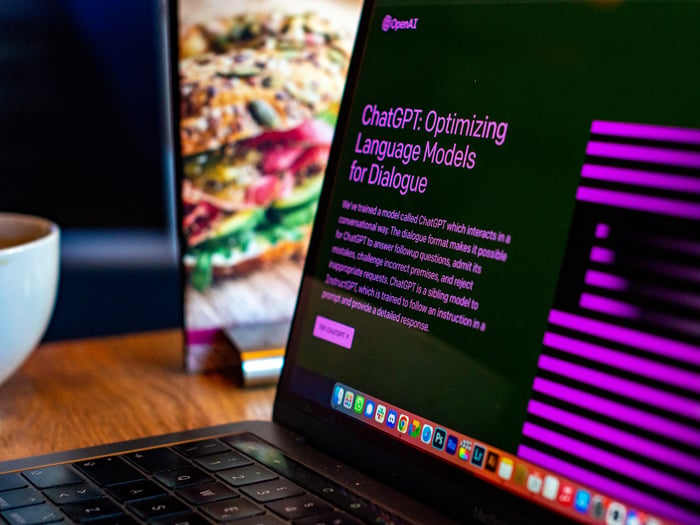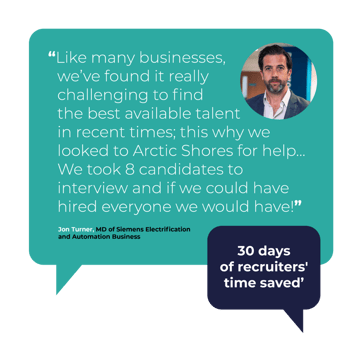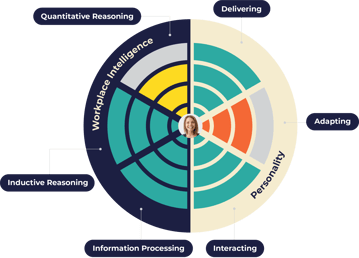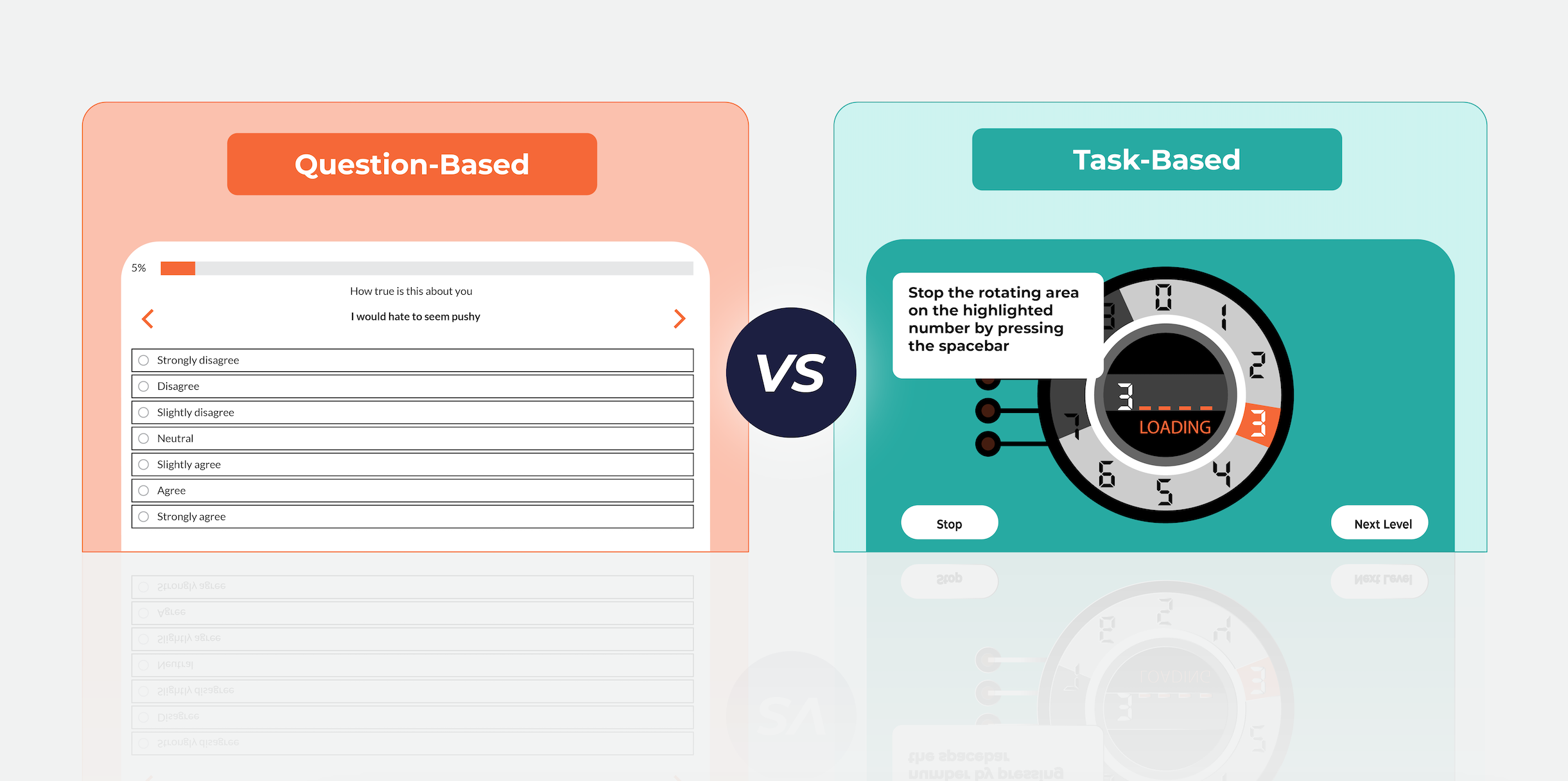ChatGPT has broken traditional aptitude assessments: Your solution to future-proofing recruitment
Wednesday 5th July
%20%20(837%20%C3%97%20565px)%20(1)-3.png)
Generative AI models like ChatGPT are already changing the way we work and now they're disrupting the way we hire too –– making traditional methods that were already easy to cheat even more ineffective than they already were.
In just six months, Open AI released an update to ChatGPT that was 10X more advanced than its predecessor. Another release is already in development for later this year, and experts say we can expect another radically more advanced version yet again.
In a world where the pace of change is speeding up, not slowing down, talent acquisition teams are facing two major challenges. And they need to act fast.
1. It’s become even harder to capture the true ability of a candidate using traditional recruitment tools.
Whether it’s ChatGPT writing a candidate a killer cover letter or telling them how to answer a multiple choice psychometric assessment so they’ll meet the right criteria for a graduate scheme, the talent acquisition landscape now feels like a minefield.
Talent acquisition leaders are already reporting that candidates are showing up to interviews not matching the polish of their CVs or the scores in their aptitude tests. Traditional recruitment methods are now well and truly broken.

2. The future of work requires different cognitive abilities from the past.
For knowledge workers in particular, a 2:1 degree is no longer a good enough measure. The best candidates must be able to learn, unlearn, and relearn new skills in continuous cycles. They need to be strong problem solvers, adaptable to change, have great reasoning skills, and they need high emotional intelligence. These are the qualities we need to measure in a world of generative AI. We need to measure them all. And we need to measure them in a way that shows us a candidate’s true potential to succeed in a role, not just how good they are at using tools like ChatGPT.
To make matters worse, that’s on top of the challenges TA teams were already facing. Spiralling salary costs, shrinking talent pools, and –– despite years of hard work –– diversity targets feel harder to hit than ever.
If we didn’t think we were using the wrong tools for the job before, there’s now no denying it.
It’s clear we need a new approach. And the good news is, we’ve spent the last nine years developing one.
The end of the aptitude test as we know it.
First up, why do we use aptitude tests in the first place? It’s because science shows us that strong cognitive ability is the greatest predictor of success in a role. Which makes a lot of sense, as cognitive ability includes things like learning agility, problem solving, and emotional intelligence – all essential qualities in the modern workplace.
Talent leaders look to ‘aptitude tests’ to help them measure candidates’ cognitive ability, and understand whether they have what it takes to succeed in the role. Most of these aptitude tests are ‘question-based’, using multiple-choice questions to assess candidates.
But as we’ve already established, in the age of ChatGPT, anyone can turn to generative AI for answers, and candidates are already adopting these new tools to improve their chances. This trend is only going to get bigger as the market is flooded with browser plugins like Wolfram Alpha and Whisper.ai, making it even easier and faster to get the answers you need to fake a test. Research shows that 48% of students already plan to use these tools within this year’s graduate hiring cycle. If you’re relying on an assessment with text or multiple choice inputs, your selection method is now obsolete.
Although the research shows that these methods have actually been obsolete for decades. Psychologists like Jodoin (2003) and Wolkowitz, Foley, and Zurn (2021) point out that traditional multiple choice assessments tend to underestimate candidates’ ability.
Added to this, a 2003 study by Hausdorf, LeBlanc, Chawla also showed that while all candidates are at a disadvantage from a question-based assessment, diverse candidates (from under-represented groups) are disproportionately affected. This is because people in under-represented groups are more likely to have anxiety in a multiple choice scenario because they worry about falling victim to stereotypes.
The better way to measure aptitude according to psychologists? Interactive, task-based assessments are scientifically proven to be more accurate than traditional question-based formats, delivering bigger, more diverse talent pools.
Introducing the next generation of aptitude assessments from Arctic Shores
 Arctic Shores first pioneered the task-based assessment back in 2015, when our trailblazing team of data scientists and psychometricians broke boundaries with our Personality assessment.
Arctic Shores first pioneered the task-based assessment back in 2015, when our trailblazing team of data scientists and psychometricians broke boundaries with our Personality assessment.
We overhauled the typical, self-report questionnaire with a series of engaging, puzzle-based tasks and added extra levels of pazazz to the experience. From detailed feedback reports delivered instantly to candidates and managers on completion of the assessment (compiled using over 12,000 data points digested by our algorithm), to an ever-expanding choice of tasks to choose from built using the latest neuroscience.
Our tasks helped companies like Siemens increase the size of their talent pool 6X, achieve a 50:50 gender shortlist in the vastly under-represented engineering sector, and fill a role in 41 days that had previously been open for over 200. Plus, 85% of candidates have reported actually enjoying it.
Now, we’ve brought what we’ve learned about how to create engaging, high performing Personality Assessments to the Aptitude Test market.
Today, Arctic Shores assesses Personality and what we call Workplace Intelligence –– when you measure them together, you get the most holistic picture of someone’s ability to succeed in a role. And now you’re able to measure them in a way that’s 100% ChatGPT proof.

The truth is, Workplace Intelligence is as far away from traditional aptitude tests as spaceships are from horses: they’ll both get you from one place to another, but your final destination will be very different. When it comes to measuring aptitude, Workplace Intelligence is a quantum leap forward.
We’ll help you measure everything from reasoning skills and ability to learn, to problem-solving and the ability to spot patterns and apply what you’ve learnt to new situations. What’s more, you’ll soon be able to gain insight into a candidates’ emotional intelligence - traditionally unheard of in aptitude tests, but a hugely important quality for many modern businesses.
How does the Arctic Shores approach work?
Rather than just telling you which box someone checked, our Workplace Intelligence assessment builds a more comprehensive picture of how people actually think and learn at work. Plus, it offers a more engaging candidate experience than traditional aptitude tests; and allows us to tap into larger, more diverse talent pools while still getting access to the best (previously overlooked) talent.
The heart of this revolutionary approach? Replacing multiple choice questions with engaging, interactive tasks that natural language models (like those used to power Generative AI) can’t complete.
Tasks not questions
Our tasks are meticulously designed to create an engaging candidate experience and to help candidates build their answers step by step. It’s a much more captivating process than a multiple choice questionnaire. It helps candidates get in the zone and lets their natural abilities shine through, without any fear of prejudice or stereotyping.
This means that every candidate completing a Workplace Intelligence task gets a fair shot at showing their potential, in a way they'll never get in a multiple choice aptitude test. Plus, they'll get an instant feedback report with their own results so you get to give them something back for their time.
And because of the way candidates complete them, they can’t be manipulated by tools like ChatGPT or other plug-ins.

An assessment, not a stress test –– scoring the process, not just the result
Our tasks also let us overhaul the scoring method used in traditional aptitude tests, which tend to rely on a binary “right” or “wrong” answer.
Our initial research shows that 20% of candidates who choose the wrong answer when the result is ‘binary’ actually get 90% of the solution correct. They have the potential to succeed in the job, but they’re screened out because the scoring system isn’t nuanced enough.
In contrast, the nature of our tasks means that we can score every move they make, giving us a more accurate picture of things like their ability to learn, how well they explore problems, and how they deal with complexity.
When you think about it, these are qualities we really value in the modern workplace, far more than always getting the “right” answer. And in the age of ChatGPT, where we’re not even sure what the “right” answer will be, these skills are about to become far more important.
In short, the scoring methodology we’ve introduced into Workplace Intelligence lets you accurately screen in candidates who get most of their answers correct. Just like you would in an interview. That means you’re adding an additional 20% of candidates to your talent pool just by switching how you assess.
The result?
Workplace Intelligence from Arctic Shores is the new gold standard in measuring cognitive ability. It’s more accurate at predicting someone’s capability than a 2:1 ever was and it’s immune to manipulation from Generative AI.
It’s empowering progressive Talent Acquisition teams to make smarter hires faster, future proof their selection process in the age of ChatGPT, and celebrate diversity –– rather than penalising it.
If you need to future-proof your selection process quickly and effectively, get in touch. We can have you up and running in weeks and our team of experienced Business Psychologists will be with you for as long as you need us.
Sign up for the TA Disruptors newsletter and get insight into the latest Gen AI trends impacting TA leaders in your inbox, every week👇
Read Next
Sign up for our newsletter to be notified as soon as our next research piece drops.
Join over 2,000 disruptive TA leaders and get insights into the latest trends turning TA on its head in your inbox, every week
Sign up for our newsletter to be notified as soon as our next research piece drops.
Join over 2,000 disruptive TA leaders and get insights into the latest trends turning TA on its head in your inbox, every week


